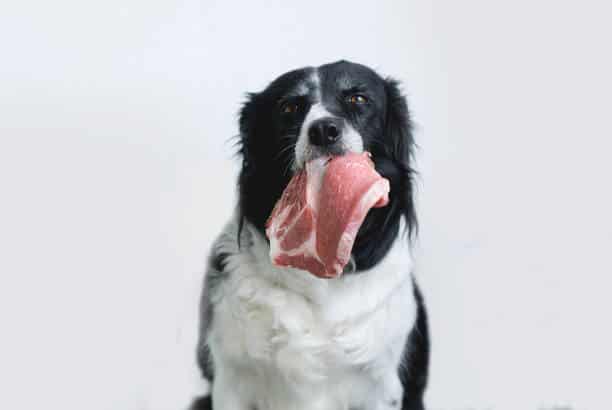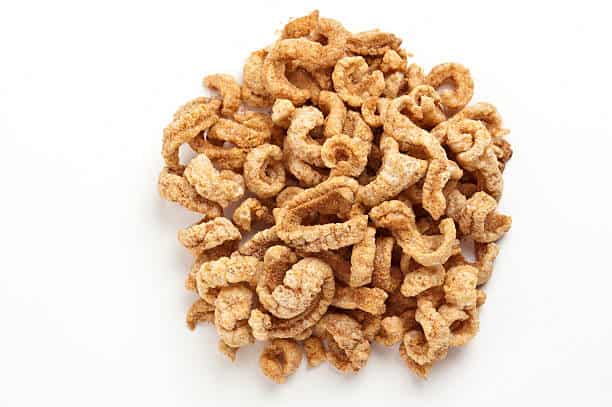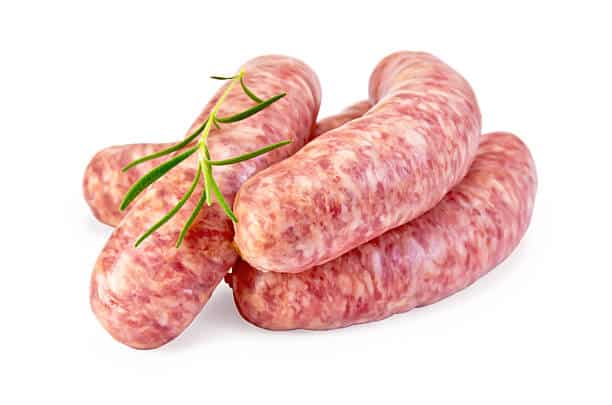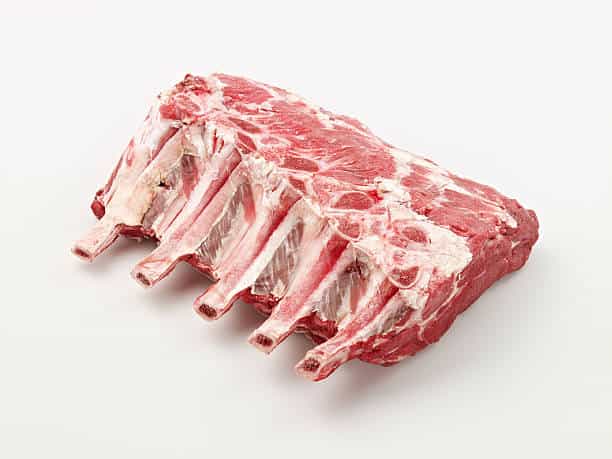So can dogs eat pork? There isn’t a straight answer. Although plain and cooked pork is safe for dogs, never season it with extra spicing. Seasonings and spices make pork highly toxic to dogs. Also, steer clear from raw pork meat.
Today we will delve into the ins and outs of feeding your canine friend pork – from dissecting potential threats in its different forms to providing safer alternatives for their diet. Ready? Let’s reveal some surprising truths about dogs and pork!
Is Pork Safe For Dogs To Eat?
Pork is generally safe for dogs to eat, but there are important factors to consider regarding the type of pork and how it is prepared.
Assessing The Safety Of Pork Chops For Dogs
Safety is paramount when feeding our beloved canine companions, and pork raises many questions for dog owners.
Raw or undercooked pork presents serious health risks to dogs due to its ability to harbor parasites such as Trichinella spiralis larvae, a roundworm that can cause significant illness.
Moreover, common seasonings associated with pork, like onions and garlic are toxic to dogs, posing an additional hazard. Pork also has the potential to be high in fat content, which can lead dogs toward pancreatitis – an inflammation of the pancreas typically caused by excessive fat consumption.
This doesn’t even touch on processed versions of this meat, including deli ham, bacon, and sausage; these treats may tantalize your pup’s tastebuds but often contain excessive amounts of sugar, excess salt, and potentially harmful additives.
Therefore, while delicious for humans at Sunday barbecues or morning breakfasts alike – one must consider the real impact before indulging their four-legged friend in a bite.

Different Types Of Pork And Their Impact On Dogs
Can Dogs Eat Pork Bones?
Despite their allure, pork bones present significant dangers to our canine companions. Firstly, sharp fragments from the bones could pose a choking hazard or obstruct your dog’s digestive system.
Further compounding this risk, cooked bones are especially prone to splintering when chewed on by dogs. These tiny shards can cause serious damage to your pet’s mouth, throat, or intestines – leading to painful and sometimes life-threatening complications.
Hence while it may seem natural and instinctual for dogs to gnaw on bones, vets strongly advise against giving them any form of pork bone due to its inherent risks and potential health issues.
Stay cautious with what you feed your furry friend; prioritize their safety above satisfying their carnivorous cravings!
Can Dogs Eat Raw Pork?
Feeding your canine companion raw pork is a risky move. This uncooked meat harbors harmful bacteria such as Yersinia Enterocolitica and Trichinella parasites, well-known for causing conditions like trichinellosis in dogs.
These health risks can lead to an array of undesirable symptoms, including vomiting, diarrhea, fever, lethargy, inflammation and pain – disrupting the overall wellness of your beloved pet.
To safeguard their health from these potential threats lurking in raw pork, you should stick with properly cooked meats void of seasonings such as onions or garlic.
Can Dogs Eat Pork Rinds Or Raw Pork Rinds?
While pork rinds, made from pig skin and often deep-fried, may not be toxic for dogs, they are not recommended as a regular part of their diet. Plain pork rinds are high in fat and sodium content, which can lead to obesity and high blood pressure in dogs.
Some brands of pork rinds may be flavored with harmful seasonings like garlic powder or onion powder, which can be toxic to dogs. It’s best to avoid feeding your canine companion even an ounce of pork rinds.
Instead, opt for healthier treat options specifically formulated for their dietary needs.

Can Dogs Eat Pork Skins?
Pork skins, also known as pork rinds, can be a tasty snack for humans, but are they safe for dogs?
Pork skins can be high in fat and salt content and pose health risks for dogs if consumed in large quantities. Excessive fat consumption can lead to pancreatitis, a pancreas inflammation that can cause serious health issues.
Always read the label and ensure no harmful seasonings or additives are present before feeding pork skins to your furry friend.
As with any new food introduction, starting with small amounts and monitoring your dog closely for any signs of stomach upset or allergic reactions is recommended.
Can Dogs Eat Pork Sausages?
Pork sausages are not recommended for dogs. They can be high in fat and sodium, leading to health issues such as pancreatitis and high blood pressure. Many commercial sausages contain seasonings which are toxic to dogs if consumed in large quantities.
It’s best to avoid giving pork sausages to your furry friend and opt for healthier treat options specifically made for dogs.

Can Dogs Eat Pulled Pork?
While plain, unseasoned pulled pork in small amounts may be okay for some dogs, it’s important to exercise caution.
Pulled pork often contains sauces, seasonings, and potentially harmful ingredients like onions or garlic, which can be toxic to dogs. The high-fat content of pulled pork can lead to digestive issues and even pancreatitis in some dogs.
It’s best to avoid sharing this flavorful dish and opt for healthier alternatives.
Can Dogs Eat Pork Skin?
Pork skin is not recommended for dogs to eat. While some dogs may be able to tolerate small amounts of pork skin, it can pose several risks. Pork skins are often high in fat and can be difficult for dogs to digest, which may lead to gastrointestinal upset or even pancreatitis.
Additionally, seasoned or flavored pork skins may contain ingredients like garlic or onion powder, which are toxic to dogs. To ensure your dog’s safety and overall health, it’s best to avoid feeding them pork skin altogether.
Can Dogs Eat Raw Pork Bones?
Pork chop bones should never be given to dogs. Raw bones, including pork bones, can pose serious health risks for dogs. Firstly, raw bones have a higher risk of splintering and causing choking hazards or internal injuries to your dog’s digestive system.
Also, raw pork carries the potential threat of transmitting a parasite known as Trichinella spiralis, which can cause a dangerous condition called trichinellosis or trichinosis in dogs.
This is why you should avoid feeding your canine companion any raw diet, including raw pork bones. Opt for safer alternatives specifically designed for dogs’ chewing needs instead.

Can Dogs Eat Pork And Beans?
Pork and beans can be a tasty dish for humans, but caution should be taken regarding dogs. While plain pork is generally safe for dogs to consume in moderation, adding beans can pose potential health risks.
Beans cause gas and digestive issues in dogs due to their high fiber content. Many canned pork and beans contain seasonings which is toxic to dogs if consumed in large amounts.
Can Dogs Eat Pork Shoulder Bone?
Pork shoulder bones are not safe for dogs to eat. Both cooked and raw pork bones can pose a serious risk of causing obstructions in a dog’s digestive system, which may require surgical intervention. These bones can splinter and easily break into small pieces, leading to choking hazards or puncturing the intestinal tract. Giving dogs pork shoulder bones can expose them to harmful bacteria like Yersinia Enterocolitica and Staph, which could cause food poisoning symptoms such as vomiting and diarrhea.
Can Dogs Eat Pork Bones Raw?
Raw pork bones can pose serious risks to dogs and cause severe gastrointestinal damage or blockages in a dog’s digestive system. Surgery may be necessary to remove the bone fragments in the worst cases.
Raw meat can lead to a condition called trichinellosis in dogs.
Can Dogs Eat Pork Neck Bones?
Pork neck bones are not safe for dogs to eat. Like other pork bones, these bones can pose a serious risk of causing obstruction in the digestive system if ingested by dogs. This can lead to discomfort and potential injury to their gastrointestinal tract.
Can Dogs Eat Fried Pork Skins?
Fried pork skins, or pork rinds, may be a popular snack for you, but they are not recommended for dogs. These crispy treats are high in fat and can cause digestive upset in dogs.
Excessive consumption of fried pork skins can lead to stomach discomfort, nausea, vomiting, or diarrhea. Moreover, the seasoning and flavorings used on pork rinds may contain ingredients that could harm dogs.
Can Dogs Eat Cooked Pork Meat?
Cooked pork meat is generally safe for dogs to eat in moderation. However, the pork should be plain and without any added seasonings or sauces. Seasonings like garlic powder, onion powder, nutmeg, raisins, cocoa powder, and chives can harm dogs.
Processed pork products such as deli ham, bacon, and sausage may contain excess fat, sugar, salt, and additives that can harm dogs. Portion control is key when feeding your canine companion cooked pork meat or other human food.
Potential Health Issues Related To Dogs Eating Pork
Dogs eating pork can potentially lead to various health issues.
- Bacterial infections, such as Yersinia enterocolitica and Staph, can occur from consuming contaminated pork.
- There is a risk of pancreatitis due to the high-fat content in pork.
- Food allergies may also arise, especially if dogs having sensitive stomachs are given ingredients commonly found in seasoned pork products.
- Lastly, ingesting pork bones poses a choking hazard and can cause damage to a dog’s digestive system if not properly handled.
Bacterial Infections
Raw pork can pose a risk of bacterial infections for dogs. One common concern is the potential transmission of a roundworm parasite called Trichinella spiralis.
This parasite can cause a condition known as trichinellosis or trichinosis, which can lead to gastrointestinal upset and muscle pain in dogs.
Pork may be contaminated with harmful bacteria like Yersinia enterocolitica and Staphylococcus aureus, which can cause food poisoning in dogs. Cook pork thoroughly before feeding.
Risk Of Pancreatitis
Excessive pork consumption can pose a serious risk to a dog’s health, including potentially developing pancreatitis. Pancreatitis is an inflammation of the pancreas that can be painful and even life-threatening for dogs.
Pork, especially high-fat cuts or processed pork products like bacon and sausage, contains significant amounts of fat that can trigger an inflammatory response in a dog’s pancreas.
This condition requires immediate veterinary attention and can lead to abdominal pain, loss of appetite, vomiting, and lethargy.
Food Allergies
Food allergies can be a concern for dogs when consuming pork. While rare, some dogs may develop an allergic reaction to certain proteins found in pork. Symptoms of food allergies in dogs include itching, skin rashes, vomiting, and diarrhea.
Pay attention to any changes in your dog’s behavior or health after they eat pork, and consult with a veterinarian if you suspect an allergy. Processed pork products like sausages or bacon may contain added ingredients that could trigger an allergic response in some dogs.
Choking Hazard From Pork Bones
Pork bones can pose a serious choking hazard to dogs. When dogs chew on pork bones, they can get lodged in their throat or digestive tract. This can lead to severe injuries, blockages, or even punctures in the intestines.
Never give your dog cooked pork bones or any kind of bone, as this risk remains whether the bone is raw or cooked.
How To Feed Your Dog Pork Safely?
- Choose lean cuts of pork that have minimal fat content.
- Cook the pork thoroughly to kill any potential bacteria or parasites present.
- Remove all bones from the pork before feeding it to your dog to prevent choking hazards and digestive issues.
- Avoid seasoning the pork with onions, garlic, or other harmful ingredients that are toxic to dogs.
- Limit the amount of pork you give your dog and incorporate it as an occasional treat rather than a regular part of their diet.
Healthier Alternatives To Pork
Lean chicken:
Chicken is a great source of protein for dogs and can be prepared in various ways, including boiled, grilled, or baked. Just remove the skin and any seasoning before feeding it to your dog.
Turkey:
Like chicken, turkey is another lean meat option dogs can enjoy. It can be cooked without seasoning and served in small, bite-sized pieces.
Fish:
Fish like salmon or tuna are excellent sources of omega-3 fatty acids, which promote a healthy coat and skin for dogs. Remove any bones and cook the fish thoroughly before feeding it to your dog.
Eggs:
Eggs are a complete source of protein and can be scrambled or boiled without any seasoning for your dog. They can also be a great choice for dogs with food allergies.
Quinoa:
This grain-like seed is packed with protein and essential amino acids. Cooked quinoa can be mixed with other ingredients like vegetables or meat to create a balanced meal for your dog.
Sweet potatoes:
Rich in fiber, essential vitamins, and minerals, sweet potatoes are a nutritious alternative to pork. They can be boiled, mashed, or baked after removing the skin.
Conclusion
In conclusion, while pork is not toxic to dogs, do exercise caution when offering it to your furry friend. Avoid giving them bones or seasoned pork products containing harmful ingredients like onions and garlic.
Also, be mindful of the fat content in pork, as excessive consumption can lead to pancreatitis. Opt for healthier alternatives and remember that portion control is key for your dog’s health and well-being.
FAQs
1. Is it safe for dogs to eat pork?
In moderation and cooked thoroughly, pork can be safe for dogs to consume. However, certain pig parts, such as bones and fatty pieces, should be avoided due to potential health risks.
2. Are there any risks associated with feeding my dog pork?
Feeding your dog excessive amounts of pork or giving them uncooked or seasoned pork can lead to digestive issues like upset stomach, pancreatitis, or even food poisoning from bacteria like salmonella or trichinosis.
3. Can I include small amounts of pork in my dog’s diet?
Small amounts of lean, cooked plain pork without seasoning can be included in your dog’s diet as an occasional treat or added protein source. It is important to consult with your veterinarian regarding the appropriate portion size based on your dog’s breed, weight, and overall health.
4. What are some alternatives to provide my dog with protein besides pork?
If you’re looking for alternative sources of protein for your furry friend, consider options like lean chicken, turkey breast (skinless), fish (without bones), cottage cheese, eggs (cooked), or specific commercial pet foods formulated with balanced nutrition for dogs. Always introduce new foods gradually and observe any adverse reactions that may occur.
Author Profile
- Site Owner And Dog Lover
-
Aritra, the founder of Labradorandyou.com, is a lifelong dog lover whose passion ignited for Labradors for their loyalty and intelligence. With extensive research and personal experiences, Aritra has become a Labrador expert, offering a rich resource on the breed. Labradorandyou.com provides reliable, timely, and evidence-based information, including Labrador-specific product reviews, training techniques, and care tips.
Labradorandyou.com was born out of Aritra's passion and his desire to share his profound knowledge about the breed. The site serves as a comprehensive resource, offering a wealth of up-to-date information for Labrador owners and enthusiasts alike
Also by the author
-
 Lab-TypesNovember 17, 2023Old Dog Seizures: Causes, Symptoms, and Treatment Options
Lab-TypesNovember 17, 2023Old Dog Seizures: Causes, Symptoms, and Treatment Options
-
 Lab-TypesNovember 17, 2023Why Is My Dogs Poop Yellow? 8 Reasons & Solutions
Lab-TypesNovember 17, 2023Why Is My Dogs Poop Yellow? 8 Reasons & Solutions
-
 ReviewsNovember 17, 2023The Only Hill’s Science Diet Review You Need To Read
ReviewsNovember 17, 2023The Only Hill’s Science Diet Review You Need To Read
-
 Lab-TypesNovember 17, 2023How To Adopt An Emotional Support Dog?
Lab-TypesNovember 17, 2023How To Adopt An Emotional Support Dog?





